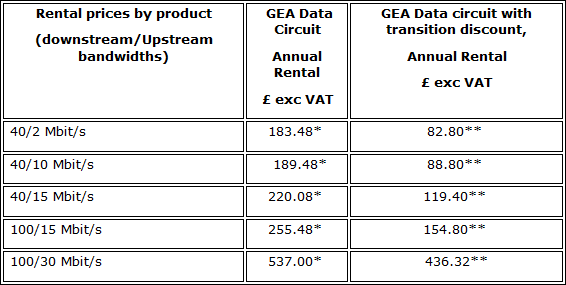 It is possible to get an idea of the price difference by looking at the raw rental costs from BT's current FTTP pilot schemes. Take note that the following represents BT's latest annual rental charges for June 2010 only, they are not finalised.
It is possible to get an idea of the price difference by looking at the raw rental costs from BT's current FTTP pilot schemes. Take note that the following represents BT's latest annual rental charges for June 2010 only, they are not finalised. BT Openreach Statement
The pilot prices align with indicative prices already made available to CPs [ISPs] and ensure a consistent approach across the GEA [FTTP/FTTC] portfolio. CPs are reminded that they will need to order a GEA Cablelink at the appropriate point(s) of handover, the price for which is already shown in the Openreach Price List. The “Transition product” pricing terms are only available where GEA-FTTP is purchased in conjunction with an existing WLR [Line Rental] or MPF service. If the associated WLR or MPF service is terminated, the full annual rental charges for the appropriate GEA-FTTP product variant will apply from the termination date of the WLR or MPF service. Consumers will of course pay more than the quoted prices because the rental charges do not include all the extras that an ISP has to tack-on, including a healthy profit margin. The extras, or necessary service features, are what make it a useable service and often equate to double the original cost. For example the basic 40Mbps (2Mbps upload) service works out as around £15 per month for the raw rental price. Most FTTC offering UK ISPs are currently selling the same product for around £20-30+ per month, depending on usage allowance, value added extras and profit margins. We could therefore see some residential 100Mbps (15Mbps uploads) products costing around £40+ per month, though this is just a guess and bundles with other services (phone/voice calls) would also be cheaper. All services run off a minimum 12 month contract period so any ISP offering this specific FTTP product would not be able to offer shorter contract terms; it is the same for FTTC.
The BT FTTP service, while initially likely to be quite expensive, will still be wonderful if you can actually get it. However those who are unlikely to be covered by the operators initial rollout should not fret. There are many other operators, such as i3 Group's Fibrecity and Fibrestream's NextGenUs project, which are busy deploying true 100Mbps Fibre-to-the-Home (FTTH) services directly into towns, cities and even remote rural communities around the country. Similarly Virgin Media, which already offers speeds of up to 50Mbps and covers approximately half of the country with its network of mixed fibre optic and coax cabling, will soon launch a 100Mbps service of its own. The government is even planning to help support the deployment of "super fast" fibre optic broadband services around the country from 2012; prior to that it will also seek to make it easier for private firms to lay fibre via existing cable ducts by forcing operators to open up their infrastructure. To cut a long story short. It could take several years for the fastest generation of 100Mbps capable fibre optic broadband services to roll out around the country. It's likely that the halfway house of 40Mbps FTTC will dominate the landscape in the short-medium term but we anticipate FTTP style products becoming increasingly common. Prices will inevitably fall and service options should increase. The future is looking fast and bright, even if it might take us a little while to get there.
|